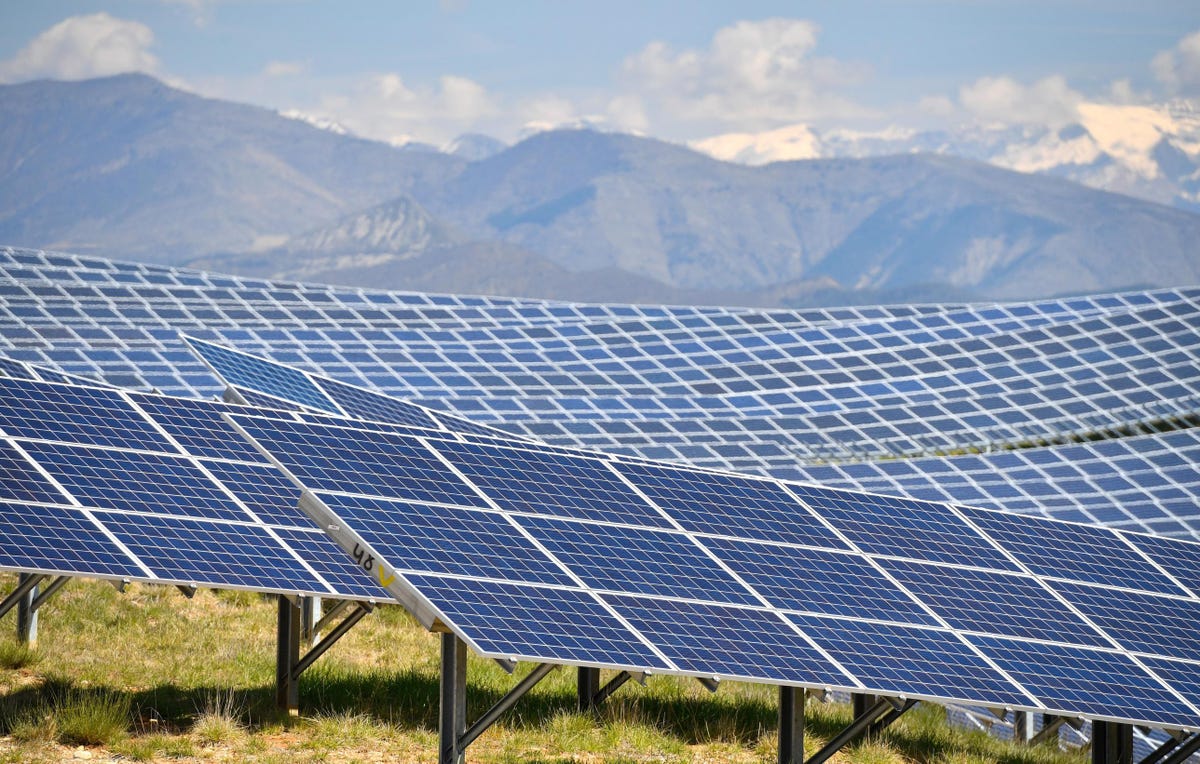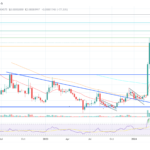[ad_1]
Earlier this month I wrote about Impaakt, a Swiss startup that aims to improve the way corporations are rated for their impact on people, such as financial inclusion, diversity and job creation, and their impact on the environment — pollution, water consumption, waste.
It also has innovated on the evaluation process, using a small central staff with reporting from 600 professional contributors around the world. Their reports are then put before 50,000 trained volunteer raters who score companies from +5 to -5 in a crowdfunding exercise.
Solar energy firms scored high on Impaakt’s evaluations.(Photo credit GERARD JULIEN/AFP via Getty … [+]
Companies in solar energy rank high, while mining and oil companies generally scored poorly for their environmental impact. Sylvain Massot, co-founder and chief financial officer at Impaakt, explained that several fintech and firms scored well but banks often lost points for their support of fossil fuel companies.
“Global scores are positive for the software & IT services industry because they mostly provide services that produce very small negative externalities. This is particularly true when looking at their operations. For example, we have not included ‘Operational waste’ or ‘Operational water consumption’ as a topic for this industry because it is not a critical issue,” he said.
Global Payments was one of the highest ranked companies, in fourth place after two solar energy companies and Illumina, a health care leader generating around 90% of global genetic sequencing data. But it was ahead of Moderna, the biotech firm that produced mRNA for Covid-19 vaccines.
Global Payments is well rated because it handles about 8% of contactless payments worldwide, said Massot.
“Moreover, the company has a ‘Social Solutions analysis’ that describes how they have empowered 3.5 million small and midsize companies through its services.” In addition it has a subsidiary, TouchNet, which provides financial management education for university students.
“It provides solutions for students to help them pay, manage and plan their tuition fees as well as other types of payments related to their education.”
Visa and Mastercard got high scores for financial inclusion and financial education. (Photo by Tim … [+]
Visa also scored well. The largest player in the card industry, it processed 48.8% of digital transactions. Impaakt said its services help SMEs. Visa also provides access to financial services for around 500 million underbanked people around the world.
Two insurance companies — Generali and Zurich, also scored well. They have small environmental impact and provide peace of mind and well-being to their customers.
“The community also praises both companies for their role in empowering SMEs as well as individuals by making them more resilient to economic hardship and protecting them from extreme climate events. For example: “Generali assisted financially 116,000 SMEs and set up digital tools for 1,700,000 SMEs in 2020-21,” the report said. Zurich’s Flood Resilience Alliance has helped 225,000 people, Impaakt added.
Several global banks scored badly, often over their providing financing for the fossil fuel industry, or for money laundering, or for both. Credit Suisse got points for financing the economy but lost points for its $74 billion contribution to fossil fuel companies and for failing to prevent corrupt and illegal practice such as money laundering. HSBC was criticized for $42 billion in fossil fuel finance plus several accounts of bribery, money laundering, data security breaches and financial excess through credit card issuance and predatory lending.
The story was much the same for Credit Agricole. Massot said that for every dollar Credit Agricole spent on renewable energy products it spends $4 on fossil fuel companies which results in their continuing to generate massive GHC (greenhouse gas) emissions which contribute to global warming.
The structure of Impaakt’s rating system takes a holistic view of energy companies like ExxonMobil, he added.
“We look both at the negative impact of producing fossil fuels such as pollution, GHG emissions but also at the positives — providing necessary energy and petrochemical products to the planet,” he said.
“At the end of the day, what is really interesting with our materiality assessment of the various impacts — how big or small they are — is that we consider all the impacts whether positive or negative. But the overall score is the result of the weighting of these impacts by the community according to the importance that the community attribute to each of these topics. It is different from all other approaches that rely on the arbitrary weighting decision made by an individual sitting in an office in Geneva or New York.”
[ad_2]
Source link
My NEO Group:
– White paper My NEO Group: https://myneo.org
– Discover NEO X: https://docs.myneo.org/products/in-development/neo-x
– Disccover NEO Dash: https://myneodash.com
– Discover Banca NEO: https://bancaneo.org
– Interview of the CEO of My NEO Group, Mickael Mosse, in Forbes: https://forbesbaltics.com/en/money/article/mickael-mosse-affirms-commitment-to-redefining-online-banking-with-bancaneo






